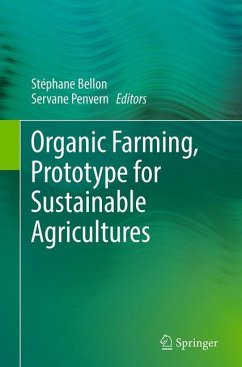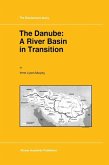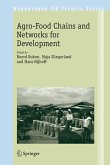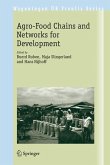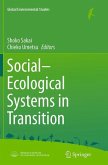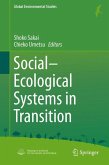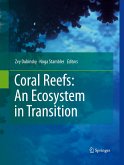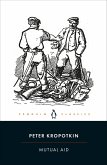Organic Farming, Prototype for Sustainable Agricultures
Herausgegeben:Bellon, Stéphane; Penvern, Servane
Organic Farming, Prototype for Sustainable Agricultures
Herausgegeben:Bellon, Stéphane; Penvern, Servane
- Broschiertes Buch
- Merkliste
- Auf die Merkliste
- Bewerten Bewerten
- Teilen
- Produkt teilen
- Produkterinnerung
- Produkterinnerung
Stakeholders show a growing interest for organic food and farming (OF&F), which becomes a societal component. Rather than questioning whether OF&F outperforms conventional agriculture or not, the main question addressed in this book is how, and in what conditions, OF&F may be considered as a prototype towards sustainable agricultures. The book gathers 25 papers introduced in a first chapter. The first section investigates OF&F production processes and its capacity to benefit from the systems functioning to achieve higher self-sufficiency. The second one proposes an overview of organic…mehr
Andere Kunden interessierten sich auch für
![The Danube: A River Basin in Transition The Danube: A River Basin in Transition]() I.L. MurphyThe Danube: A River Basin in Transition75,99 €
I.L. MurphyThe Danube: A River Basin in Transition75,99 €![The Agro-Food Chains and Networks for Development The Agro-Food Chains and Networks for Development]() Ruerd Ruben / Maja Slingerland / Hans Nijhoff (eds.)The Agro-Food Chains and Networks for Development149,99 €
Ruerd Ruben / Maja Slingerland / Hans Nijhoff (eds.)The Agro-Food Chains and Networks for Development149,99 €![The Agro-Food Chains and Networks for Development The Agro-Food Chains and Networks for Development]() Ruerd Ruben / Maja Slingerland / Hans Nijhoff (eds.)The Agro-Food Chains and Networks for Development149,99 €
Ruerd Ruben / Maja Slingerland / Hans Nijhoff (eds.)The Agro-Food Chains and Networks for Development149,99 €![Social-Ecological Systems in Transition Social-Ecological Systems in Transition]() Social-Ecological Systems in Transition75,99 €
Social-Ecological Systems in Transition75,99 €![Social-Ecological Systems in Transition Social-Ecological Systems in Transition]() Social-Ecological Systems in Transition75,99 €
Social-Ecological Systems in Transition75,99 €![Coral Reefs: An Ecosystem in Transition Coral Reefs: An Ecosystem in Transition]() Coral Reefs: An Ecosystem in Transition224,99 €
Coral Reefs: An Ecosystem in Transition224,99 €![Mutual Aid Mutual Aid]() Peter KropotkinMutual Aid8,99 €
Peter KropotkinMutual Aid8,99 €-
-
-
Stakeholders show a growing interest for organic food and farming (OF&F), which becomes a societal component. Rather than questioning whether OF&F outperforms conventional agriculture or not, the main question addressed in this book is how, and in what conditions, OF&F may be considered as a prototype towards sustainable agricultures. The book gathers 25 papers introduced in a first chapter. The first section investigates OF&F production processes and its capacity to benefit from the systems functioning to achieve higher self-sufficiency. The second one proposes an overview of organic performances providing commodities and public goods. The third one focuses on organics development pathways within agri-food systems and territories. As well as a strong theoretical component, this book provides an overview of the new challenges for research and development. It questions the benefits as well as knowledge gaps with a particular emphasis on bottlenecks and lock-in effects at various levels.
Produktdetails
- Produktdetails
- Verlag: Springer / Springer Netherlands
- Artikelnr. des Verlages: 978-94-024-0298-8
- Softcover reprint of the original 1st ed. 2014
- Seitenzahl: 508
- Erscheinungstermin: 17. September 2016
- Englisch
- Abmessung: 235mm x 155mm x 28mm
- Gewicht: 752g
- ISBN-13: 9789402402988
- ISBN-10: 9402402985
- Artikelnr.: 45753011
- Herstellerkennzeichnung
- Springer-Verlag GmbH
- Tiergartenstr. 17
- 69121 Heidelberg
- ProductSafety@springernature.com
- Verlag: Springer / Springer Netherlands
- Artikelnr. des Verlages: 978-94-024-0298-8
- Softcover reprint of the original 1st ed. 2014
- Seitenzahl: 508
- Erscheinungstermin: 17. September 2016
- Englisch
- Abmessung: 235mm x 155mm x 28mm
- Gewicht: 752g
- ISBN-13: 9789402402988
- ISBN-10: 9402402985
- Artikelnr.: 45753011
- Herstellerkennzeichnung
- Springer-Verlag GmbH
- Tiergartenstr. 17
- 69121 Heidelberg
- ProductSafety@springernature.com
Preface.- 1. Introduction: Organic food and Farming, Prototype for Sustainable Agriculture.- PART 1 - SYSTEM'S FUNCTIONING TO IMPROVE SELF-SUFFICIENCY.- 1.1 Organic Landcare and Fertility.- 2. Soil phosphorus (P) management in organic cropping systems: from current practices to avenues for a more efficient use of P resource.- 3. Intercropping - applying ecological principles for improved nitrogen use efficiency in organic farming systems.- 1.2 Crop Protection in Organic Farming.- 4. Regulatory framework for plant protection in organic farming.- 5. Conservation biocontrol: Principles and implementation in organic farming.- 6. Contribution of agroecology to plant protection in Organic Farming: Relevance and Limits.- 7. Building apple ideotypes adapted to organic and low-input, competitive systems.- 1.3 Livestock Management and System Design.- 8. Alternatives to chemical antiparasitic drugs in livestock in organic farming.- 9. Animal healthcare strategies in organic and conventional farming.- 10. Technical and economic performances in organic sheep-for-meat farms: observations on sheep-rearing networks and experimental farms.- 11. Experiencing organic mixed-crop dairy systems: a step by step assessment and redesign centred on a long-term experiment.- PART 2 - ORGANIC PERFORMANCES: BETWEEN SOCIETAL EXPECTATIONS AND SCIENTIFIC EVIDENCE.- 2.1 Environmental Issues.- 12. Using Life Cycle Analysis to compare the environmental performance of organic and conventional apple orchards.- 13. The potential of organic agriculture to mitigate the impact of agriculture on global warming - a review.- 2.2 Animal Welfare.- 14. The respect of the five freedoms of farm animal in a context of environmental and health constraints: how much organic farming may play a role? A review.- 15. Can organic animal farmers do animal husbandry? Breaking with "animal production", a major issue for organic farming.- 2.3 Quality of OrganicProducts.- 16. Food quality and possible positive health effect of organic products.- 17. Quality of organic lamb.- 18. Is organic farming unsustainable? Analysis of the debate about the conventionalisation of the organic label.- PART 3 - DEVELOPMENT DYNAMIC AND UP-SCALING (FOOD SYSTEM AND TERRITORY).- 3.1 New Frameworks for New Valuation Criteria.- 19. Transforming Recognition of the Social, Ecological and Economic Goods and Services Derived from Organic Agriculture in the Canadian Context.- 20. Seed sector and breeding methods: challenges for organic varieties.- 21. Seed for Organic Agriculture: the Development of the Participatory Plant Breeding and the Farmers' Networks in France.- 3.2 Transition Pathways in Agri-Food Systems: Farming Practices and Food Networks.- 22. Enabling the Ecological Redesign of Organic and Conventional Agriculture: A Social Ecology and Psychosocial Perspective - Position Paper.- 23. Transitions towards organic farming at the farm and at the local scales: the role of innovative production and organisational modes and networks.- 24. Contributing to the sustainability of agro-food systems: Potentials and pitfalls for organic farming.- 25. Multi-scale integrated assessment of regional conversion to Organic Farming.
Preface.- 1. Introduction: Organic food and Farming, Prototype for Sustainable Agriculture.- PART 1 - SYSTEM'S FUNCTIONING TO IMPROVE SELF-SUFFICIENCY.- 1.1 Organic Landcare and Fertility.- 2. Soil phosphorus (P) management in organic cropping systems: from current practices to avenues for a more efficient use of P resource.- 3. Intercropping - applying ecological principles for improved nitrogen use efficiency in organic farming systems.- 1.2 Crop Protection in Organic Farming.- 4. Regulatory framework for plant protection in organic farming.- 5. Conservation biocontrol: Principles and implementation in organic farming.- 6. Contribution of agroecology to plant protection in Organic Farming: Relevance and Limits.- 7. Building apple ideotypes adapted to organic and low-input, competitive systems.- 1.3 Livestock Management and System Design.- 8. Alternatives to chemical antiparasitic drugs in livestock in organic farming.- 9. Animal healthcare strategies in organic and conventional farming.- 10. Technical and economic performances in organic sheep-for-meat farms: observations on sheep-rearing networks and experimental farms.- 11. Experiencing organic mixed-crop dairy systems: a step by step assessment and redesign centred on a long-term experiment.- PART 2 - ORGANIC PERFORMANCES: BETWEEN SOCIETAL EXPECTATIONS AND SCIENTIFIC EVIDENCE.- 2.1 Environmental Issues.- 12. Using Life Cycle Analysis to compare the environmental performance of organic and conventional apple orchards.- 13. The potential of organic agriculture to mitigate the impact of agriculture on global warming - a review.- 2.2 Animal Welfare.- 14. The respect of the five freedoms of farm animal in a context of environmental and health constraints: how much organic farming may play a role? A review.- 15. Can organic animal farmers do animal husbandry? Breaking with "animal production", a major issue for organic farming.- 2.3 Quality of OrganicProducts.- 16. Food quality and possible positive health effect of organic products.- 17. Quality of organic lamb.- 18. Is organic farming unsustainable? Analysis of the debate about the conventionalisation of the organic label.- PART 3 - DEVELOPMENT DYNAMIC AND UP-SCALING (FOOD SYSTEM AND TERRITORY).- 3.1 New Frameworks for New Valuation Criteria.- 19. Transforming Recognition of the Social, Ecological and Economic Goods and Services Derived from Organic Agriculture in the Canadian Context.- 20. Seed sector and breeding methods: challenges for organic varieties.- 21. Seed for Organic Agriculture: the Development of the Participatory Plant Breeding and the Farmers' Networks in France.- 3.2 Transition Pathways in Agri-Food Systems: Farming Practices and Food Networks.- 22. Enabling the Ecological Redesign of Organic and Conventional Agriculture: A Social Ecology and Psychosocial Perspective - Position Paper.- 23. Transitions towards organic farming at the farm and at the local scales: the role of innovative production and organisational modes and networks.- 24. Contributing to the sustainability of agro-food systems: Potentials and pitfalls for organic farming.- 25. Multi-scale integrated assessment of regional conversion to Organic Farming.

